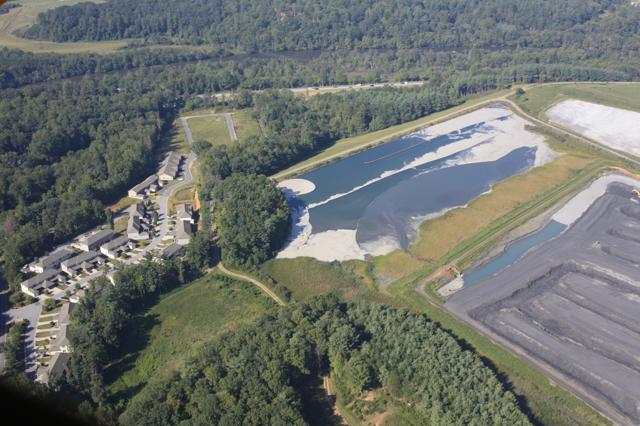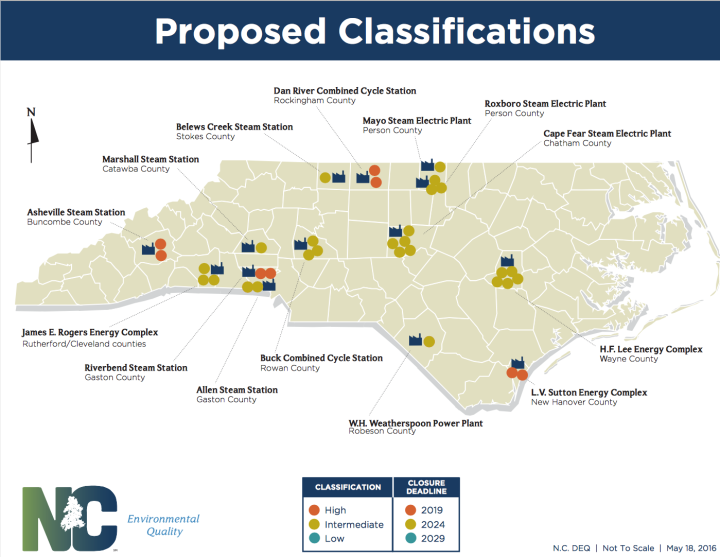The N.C. Department of Environmental Quality has classified coal ash ponds across the state by level of risk. Every newly evaluated pond was ranked as intermediate risk qualifying them for a removal deadline of the end of 2024. For the coal ash pits, that had already been classified as high risk, Duke Energy must excavate the ash and move it to dry lined storage with a monitoring system by Dec. 31, 2019. Asheville’s Lake Julian facility combustion residual storage had already been designated as high risk by the 2013 law that required today’s announced evaluation. The process was originally supposed to have been completed no later than December of 2015, however draft assessments were completed then and the new, in many cases upgraded, risk classifications are the result of a process including community input. The NCDEQ is asking to also be allowed to reevaluate the classifications in 18 months based on repairs and other conditions energy companies could meet in the interim.
By law, the NCDEQ had to classify the risk of each coal ash pond according to the following:
- Any hazards to public health, safety, or welfare resulting from the impoundment.
- The structural condition and hazard potential of the impoundment.
- The proximity of surface waters to the impoundment and whether any surface waters are contaminated or threatened by contamination as a result of the impoundment.
- Information concerning the horizontal and vertical extent of soil and groundwater contamination for all contaminants confirmed to be present in groundwater in exceedance of groundwater quality standards and all significant factors affecting contaminant transport.
- The location and nature of all receptors and significant exposure pathways.
- The geological and hydrogeological features influencing the movement and chemical and physical character of the contaminants.
- The amount and characteristics of coal combustion residuals in the impoundment.
- Whether the impoundment is located within an area subject to a 100-year flood.
- Any other factor the Department deems relevant to establishment of risk.
Press release from the NC Department of Environmental Quality:
The state environmental department today released proposed classifications for all coal ash ponds in North Carolina, while at the same time asking the General Assembly to allow the reconsideration of those classifications 18 months from now. The classifications are based on the current risk of each pond’s impact on public health and the environment. However, work that is already either planned or underway could significantly change the risk posed by the ponds.
“The deadlines in the coal ash law are too compressed to allow adequate repairs to be completed,” said Donald R. van der Vaart, secretary of the state environmental department. “It also does not allow for revisions to the classifications based on new information about a pond’s risk to public health and the environment.”
The proposed classifications include the eight mandated as high priority under the law, and 25 classified by today’s action as intermediate. High risk ponds must be dug up and closed by 2019 and intermediate ponds must be dug up and closed by 2024. The main risk factors driving today’s classifications were dam deficiencies that are currently being repaired, and potential impacts to nearby groundwater. Recent discussions indicate that providing nearby residents permanent alternative water will relieve any future concerns.
“The focus of the coal ash law was to safely close all coal ash ponds in North Carolina,” continued Secretary van der Vaart. “The intent was not to set pond closure deadlines based on incomplete information. Making decisions based on incomplete information could lead to the expenditure of billions of dollars when spending millions now would provide equal or better protection. The understanding we have today reflects countless hours of scientific and technical work by both state engineers and Duke Energy as well as thousands of comments by the public.”
Although no dams present an imminent risk to life or property, a number of ponds were rated intermediate because of unfinished repairs. State regulators will use their existing legal authority to ensure those repairs are completed by the end of this year.
The residents’ well water meets federal requirements for safe drinking water. However, Duke Energy has submitted a study that evaluates the feasibility of supplying permanent alternative water to nearby residents. The state environmental department will recommend to the General Assembly that the classifications be re-evaluated after the dam safety repairs are made and the utility provides these permanent alternative water sources to nearby well owners.
These proposed classifications will become final 60 days from today.
For a map of the proposed classifications for each coal ash impoundment, click here.
A table that shows the risk factors that determined each pond’s classification can be found here.
Press release from Sierra Club Beyond Coal Campaign:
Earlier today, the N.C. Department of Environmental Quality (DEQ) released its final risk classifications for Duke Energy’s 34 coal ash pits in the state. In accordance with the Coal Ash Management Act of 2014, these classifications determine the timeline and method Duke Energy must use to close the coal ash pits.
Today’s decision by the Department listed 8 sites as high risk and 25 as intermediate risk. None were listed as low priority, which would have meant that the ash could have been left in unlined pits and capped in place, allowing continued pollution of groundwater. The McCrory administration also requested the ability to revisit the classifications in 18 months.
“In light of overwhelming public comment asking that no community be treated as low priority, we are encouraged by today’s announcement,” said Molly Diggins, State Director of the NC Sierra Club.
“Today’s classifications are a testimony to the persistence of committed and engaged communities advocating for safe drinking water,” said Emma Greenbaum, organizing representative for the Sierra Club’s Beyond Coal campaign in North Carolina. “While today’s announcement represents a significant step forward, families living near coal ash ponds will continue to face uncertainty about their drinking water until the coal ash is removed and stored away from water sources.”
But the Sierra Club also expressed concern over DEQ’s unusual request to the legislature to be given the authority to change the classifications in 18 months. For the coal ash pits classified as high risk, Duke Energy must excavate the ash and move it to dry lined storage with a monitoring system by Dec. 31, 2019. Intermediate sites must undergo the same process by Dec. 31, 2024. If the legislature agrees to DEQ’s request, the deadline for closure plans for intermediate-risk sites would bump up against possible changes of classification.
“Without further information, the McCrory administration’s request to the legislature to be able to revisit the classifications in 18 months appears to be a request for unilateral decision making. It’s unclear what oversight or public input there will be if these classifications can be revisited immediately before the deadline for closure plans. This is exactly what the legislature sought to avoid when drafting the Coal Ash Management Act,” Diggins said.
“We need to clean up coal ash pollution,” Greenbaum said. “However, today is another reminder that the only safe and final solution will be to move off of fossil fuels and onto clean energy solutions. It’s the best way to ensure that communities are protected from the risks posed by dirty energy sources like natural gas and coal.”
Press release from Duke Energy:
Allowing a range of closure options to include capping the material on site with long-term monitoring, a faster solution that would not require hauling millions of tons of ash through communities to new locations for decades to come
Aligning North Carolina with other states in the Southeast and across the nation that are pursuing capping in place, which is recognized by the Environmental Protection Agency as a safe and proven option, wherever possible
Promoting the growth of safe coal ash recycling in construction materials and other uses, the only way to avoid permanent storage of the material
Reducing total cost to customers when compared to excavation, which is more expensive without additional measurable environmental benefits
https://www.youtube.com/watch?v=PjlQHKbjNJA





Before you comment
The comments section is here to provide a platform for civil dialogue on the issues we face together as a local community. Xpress is committed to offering this platform for all voices, but when the tone of the discussion gets nasty or strays off topic, we believe many people choose not to participate. Xpress editors are determined to moderate comments to ensure a constructive interchange is maintained. All comments judged not to be in keeping with the spirit of civil discourse will be removed and repeat violators will be banned. See here for our terms of service. Thank you for being part of this effort to promote respectful discussion.